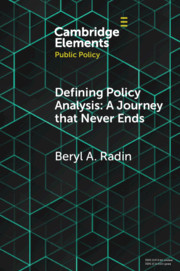Element contents
Defining Policy Analysis: A Journey that Never Ends
Published online by Cambridge University Press: 19 December 2020
Summary
- Type
- Element
- Information
- Series: Elements in Public PolicyOnline ISBN: 9781108933193Publisher: Cambridge University PressPrint publication: 28 January 2021

